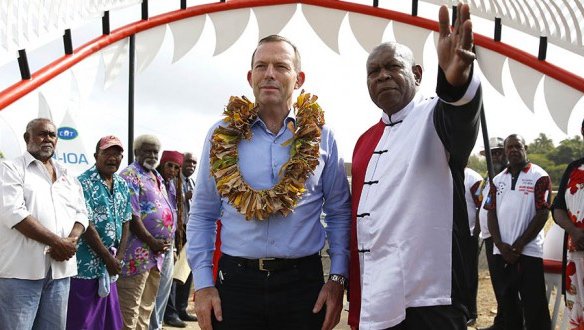Waiting for an apology
The Coalition’s record on native title is nothing to be proud of

The view from Billinudgel
Advertisement
From the front page
It was pleasing to hear Tony Abbott speak glowingly on Eddie Mabo when he visited the warrior’s grave on Mer last week.
Abbott praised the pioneering breakthrough on native title brought down by the High Court in 1992 and called it a matter of fundamental justice that Aboriginal and Torres Strait Islander people have rights to their land. But he did at least admit that, at the time, it was somewhat contentious.
This, as he certainly knows, is something of an understatement. The battle to turn the court’s decision into legislation was one of the most bitter and drawn-out in Australian history.
The 1993 Native Title Bill was brought into parliament by Paul Keating after a protracted negotiation in which the key player was the far-sighted CEO of the National Farmers Federation, Rick Farley; Farley spent much of his time hosing down farmers who were told by John Hewson and his Coalition supporters that the marauding Indigenes were set to take over not only their own properties, but the backyard of every white Australian.
The Libs and Nats opposed every clause of the bill every step of the way. However, after a lot of hard graft Keating and Farley hammered out a formula acceptable to the major stakeholders. When it finally passed, there were cheers, tears and applause in the senate, but the euphoria did not last.
When Howard won government, he proposed what he called his Ten Point Plan, the aim of which was to gut the act and effectively extinguish native title altogether. He had, he announced, a covenant with the farmers of Australia – his Aboriginal constituents were regarded as irrelevant.
In the end, his amendments were rendered a little less savage than he had originally planned, but not before he had ranted at meetings of the black community to the extent that many of them turned their backs on him. Native title remained in a diluted form, but it was made abundantly plain that Indigenous interests and outcomes were to be strictly subordinate to those of the farmers.
The government of Kevin Rudd went some way to redress the balance, most notably with the belated contrition of Sorry Day, which Abbott – though not all his Coalition colleagues – supported.
Abbott was not in parliament in 1993, so he was not an active participant in the first brawl, although he was an enthusiastic supporter of Howard in the background. He was in the thick of things by 1998, so can hardly claim to have been an innocent bystander during the time of the Ten Point Plan.
He does say that he urged Howard to agree to an apology to the stolen generations, although how much of that was political expediency and how much was heartfelt remorse may be open to question. But perhaps, after his tributes to Eddie Mabo and his legacy, our current prime minister should consider another formal and public apology: for the abuse and recalcitrance by the Coalition over the entire native title issue.
We wait with hope, though not with anticipation.








Comments
Comments are moderated and will generally be posted if they are on topic and not abusive. View the full comments policy.